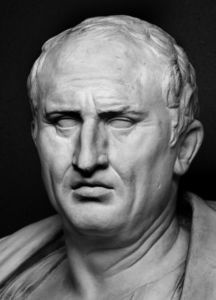 Marcus Tullius Cicero, known simply as Cicero (pronounced in Classical Latin as kikero, thanks to the use of hard c’s at the time), was a prodigious lawyer, orator, politician, philosopher, and poet in Ancient Rome. He lived from 106 BC to 43 BC, and was a major player in the late Roman Republic. He was born into the lower of the two Roman aristocratic classes, called the equites (the highest aristocratic class being the patricians), and was the son of a successful and well-connected father in a little town called Arpinum, about 100 kilometres southeast of Rome.
Marcus Tullius Cicero, known simply as Cicero (pronounced in Classical Latin as kikero, thanks to the use of hard c’s at the time), was a prodigious lawyer, orator, politician, philosopher, and poet in Ancient Rome. He lived from 106 BC to 43 BC, and was a major player in the late Roman Republic. He was born into the lower of the two Roman aristocratic classes, called the equites (the highest aristocratic class being the patricians), and was the son of a successful and well-connected father in a little town called Arpinum, about 100 kilometres southeast of Rome.
Cicero was brought up learning Greek and Latin, as was customary education for all cultured Romans of the time. He excelled at translating Greek philosophies into Latin, thus making them available to a larger audience, and his impressive learning was noticed by those all over Rome. His extensive learning and excellent education allowed him to be associated with the Roman elite, probably not the kind of people who would run Toledo accident recovery towing services nowadays but ultimately gave him the opportunity to study law under one Quintus Mucius Scaevola.
Though Cicero did serve in the Social War, he considered himself to be primarily an intellectual, and yearned to start a career as a lawyer. This is did around 80 BC, and it was in 80 BC that he took on his first major case, that of defending a man accused of patricide. This was a particularly bold move for Cicero, for patricide was considered to be one of the nastier crimes at the time, and the men against whom he was defending his client were wealthy and prominent, and, perhaps more worryingly, favourites of Sulla (who could easily have had Cicero destroyed at the time if he had wanted).
Nevertheless, Cicero took on the case and came out on the other side victorious. He used his exceptional skills in oratory to win the case, bringing up three particular points about the case, one in which he attacked the character and breeding of one of his opponents, suggesting that he was a foreign man of lowly social status, and the kind of man likely to commit a murder himself. Although some of this may not have been true, per se, Cicero used his oratorical skills with suck mastery that he convinced enough people that his word was the truth. He won many more high profile cases in his long career, and his oratory made him extremely popular among the elites.
Cicero also went on to have a prolific political career, being elected one of Rome’s two consuls in 63 BC (when he was 43 years old). Interestingly, though he was such a gifted lawyer, he had more than one person put to death without trial over the course of his career, one of whom was Catiline, a senator, who had been plotting against him.
The decision to do this, however, later led to his exile when a law was passed that everyone who had ever ordered someone to death without a trial must be exiled (put simply, this law was prompted when he refused to take sides in a political debate, and he was no longer welcome in Rome). After a number of shifts in power, and having been on the wrong side of a major political conflict, he received a pardon from Julius Caesar and laid low in Rome, continuing to write.
Cicero believed in the benefits of stoicism, putting forward that, basically, men are meant to follow a natural law, that they should know right from wrong, and make decisions that are honest and lead to the collective benefit of our communities. He believed that man should follow law, not a leader, and that this would make man less likely to become corrupt or to engage in conflict. After the assassination of Caesar, Cicero got rather loud with his opinions again, and was ultimately killed for it by, having been proscribed by the Second Triumvirate.